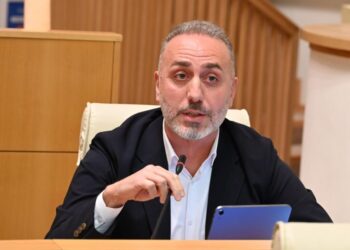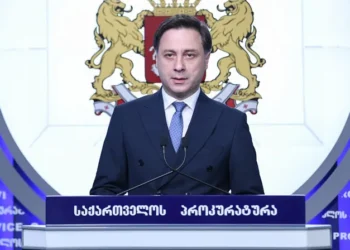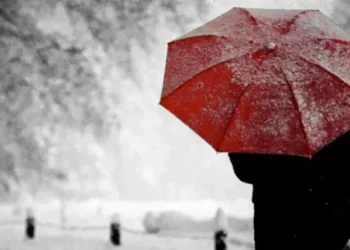Giorgi Kandelaki, 41, is a historian, a former politician of the United National Movement and European Georgia, a member of the Soviet Past Research Laboratory (SovLab), and the editor of the book ‘Georgia against Stalin,’ written by Lasha Bughadze in collaboration with SovLab and leading scientific editor Irakli Khvadagiani.
‘Georgia against Stalin’ is a non-fiction book based on extensive archive research into popular history, and boasts numerous footnotes and references. It is based on many documents which have never been published and which are largely unknown to Western scholars.
We asked Giorgi Kandelaki to tell us more.
Why has the figure of Stalin become so important for Georgia again?
The Russian disinformation warfare machine has weaponized the memories of the Soviet Union massively, not only in Georgia. Their investment has been long-term, systematic, and disciplined. In Georgia, the focus on the figure of Joseph Stalin is a central theme of this long-term effort. The Russian long-term warfare in Georgia is focused on cultivating anti-western, nativist, ethno-religious nationalism, in which Western civilization is a threat, a danger to our souls. It claims salvation can only be found in the Russian world.
This project “Stalin” is like an umbrella that brings all projects within a consistent set of values. In it, he serves as a flagship of this nationalism and is a matter of Georgian national pride. It is very important to understand that this is tailored specifically to Georgia, and it also illustrates how long-term and serious the Russian effort has been.
The narrative they push is very simple and almost genius: “A small-town boy who made it so big; our guy, who ruled over them, who had so much power, shouldn`t we be proud? Shouldn’t it be a matter of Georgian national pride?”
Who would believe this in the 20th century?
Unfortunately, Georgian society has a certain amnesia with regards the 20th century. They utilize the fact that Georgia hasn’t really settled with the Soviet Union, with what the Soviet Union did to Georgian society, and in particular what Joseph Stalin did.
Why hasn´t this evaluation happened?
It hasn’t happened for several reasons. The first is that the basis for this national pride linked with Stalin existed before the classical propaganda exercise began; it is based on something which already existed, and which was then amplified. In 1956, when de-Stalinisation started, the society that was already scared from 30 years of totalitarianism and was brainwashed, misunderstood de-Stalinisation as a move against Georgians. In the 1980s, the liberation movement side-stepped Stalin and focused entirely on Orjonikidze and Lenin, but not on Stalin.
What about the post-Soviet agenda? What was missing there?
The mistake of the Rose Revolution, even though it was a very anti-Soviet phenomenon, and saw steps undertaken to deal with the Soviet past, was that people thought the chapter on the Soviet Union had ended with the Rose Revolution.
And while the nucleus of civil society focused on the long-term path, our Soviet past was outside our bubble. Even when it became clear it was a big deal and a serious problem, still the Western and American agenda of fighting Russian disinformation focused on fact-checking and not on memory. Yet memory is an existential issue. On the Western side, conferences and complicated PowerPoint presentations produce things that don’t impact the broader masses, while the other side works precisely though memory, because memory does impact the broader masses. Everybody knows Stalin. Stalin is an image which everybody recognizes in Georgia. And we have dealt with this in a comprehensive way. Even people who know about his crimes don’t know what he did to Georgia, specifically to Georgia.
And this is the topic of the book ‘Georgia against Stalin’?
Exactly! These things have never been told in a Georgian context. Stalin is one of the most researched political figures; there are so many works about him, and Georgia is featured in many of these works, studies, articles and books – but only as a place where he was born, robbed a bank, and left.
But the conflict about Stalin and Georgia, what this book is about, is the fundamental existential clash of Stalin and the project of modernized and democratic Georgia, a project which started in the 1860s and culminated with the First Republic in 1918. The project of “Western” Georgia.
Stalin entered to clash with this project from very early on. He left in 1907, defeated. Indeed, the story of Stalin and Georgia is a story of perpetual defeat. He suffered many defeats here. The Bolsheviks were marginal here, the majority were social democrats. Stalin left Georgia because he lost, and he had a complex about it which continued when he came to power in Bolshevik Russia. This complex became his main story, and he was obsessed with the destruction of independent Georgia.
This is truly a topic which not everyone would know.
Yes. Because this story has never been told! Stalin pushed for the invasion of the Democratic Republic of Georgia. We tell this story [in the book], and explain what it was that he destroyed: Georgia`s democratic institutions, local elections, rule of law, jury trials, decentralized police, and international recognition!
Alongside the Baltic states, Finland and Poland, Georgia also got international recognition in January 1921. Georgian Ambassador Akaki Chkhenkeli was in Paris to present his credentials to the French president on the day the Red Army entered Tbilisi. We show the Georgian-Russian war of 1921, the Red Army in Tbilisi. Georgia did not join the Soviet Union voluntarily; it was imposed on Georgian society through war.
The Baltic states surrendered in 1940, and later engaged in a massive guerrilla warfare. Georgia did not surrender: It fought for one month alone against Russia, with the French navy participating in the war in Abkhazia. The French navy managed to arrive in Abkhazia, and the Georgians took Gagra by counterattack, even after Tbilisi had fallen. It was a big war with many casualties. It is not only that Georgia did not become part of the Soviet Union voluntarily, but that Georgia was an internationally recognized country that was destroyed as a result of this invasion, an invasion driven by Stalin. This story has never been told. That is how we want to deal with the weaponization of Stalin’s figure. This book is written from a Georgian patriotic perspective.
I hope you will be able to sell it in Georgia.
It is already a bestseller. We have already sold two editions. One edition is around 1,000 copies, which, for Georgia, for a printed book, is quite good. We also produce a lot of audiovisual materials for social media. And we market the book that way as well.
How do you explain the fact that in a country which is aiming to join the European Union, there is a museum which glorifies the Stalinist past?
I was involved in transforming the Stalin Museum in Gori into the Museum of Stalinism, a project launched in 2012. It was to be an equivalent to the Holocaust Museum, and would tell the story of the Stalinist crimes, and not only in Georgia. It was a very serious formidable project, but the Georgian Dream government stopped it in 2013. Last year, we had a scandal with the Polish ambassador, who commented publicly, when the war in Ukraine started: “At least close this museum!” And he had a conflict with the Georgian Ministry of Foreign Affairs. Sadly, Georgia’s most popular museum glorifies Joseph Stalin, which is the same as imagining Germany’s most popular museum glorifying Adolf Hitler. There is no difference! And your question is right: If the country wants to be a part of the EU, how is that possible?
Is the Soviet past a heavy weight lying hidden in the stores of Georgian history?
Our society has not dealt with this story. It is a hidden story: Stalin`s legacy in the faraway past. The focus in today’s Georgian schoolbooks is more on the Middle Ages, a faraway thing, than on Stalin. When you interact with Georgians, what is the focus of the discourse on history? It’s a time a thousand years ago, far away kings and queens. Yes, they are important, but the focus is not on modernity, on the last 150 years, which is an era with events which shaped our present. Very little time is devoted to this in today’s schools.
We need to shift this focus. One of the things we do with this book is work with teachers, not through schools, but through independent associations for teachers, who can use this book as a supplementary reading tool in schools, because the 20th century is when all cataclysms happened in Georgia. The story of Georgia’s tragedy in the 20th century needs to be told!
Don’t people, within their families, talk about the Stalinist past, the purges, the innocent victims of Stalinism?
The Great Terror of the 1930-40s is more or less known in popular consciousness, but is for some reason not linked with Stalin; is somehow perceived as a “natural disaster,” with nobody responsible, while Stalin’s earlier crimes related specifically to Georgia are unknown. For example, this year, we had the centennial for the 1924 armed uprising against the Bolsheviks, against Stalin, because Stalin was already leader of the Soviet Union. Little is spoken of the atrocities of the 1920s, when there was a huge resistance movement: From 130 democratically elected members of the Georgian parliament, 51 were shot and 37 exiled, of whom five died in exile. Perhaps this best demonstrates what was done to the democratic social fabric of this society by Stalin.
Do you think Georgian Dream, being over 10 years in power, has a special policy in terms of Stalin?
Yes! They embrace him! We got twelve new statues of Stalin spread all over the country. We track them. There are statues in Guria, in Kakheti, and in Imereti there are two or three. In Zestaponi, there is a huge statue of Stalin. And we see it in the polls, which show his popularity is on the rise. What are they selling in the souvenir shops in Tbilisi? Stalin souvenirs!
What role does the Georgian Church play in this Stalin game?
The Church is not only an agent of influence that projects this disinformation, but a big number of them are actively pro-Stalin. The icon scandal was not an isolated incident: It shows how the Church has been weaponized by Russian hybrid warfare. Just enter any church and see what books they are selling: it is Russian, anti-Western propaganda.
How can you counter-act this?
By telling the truth! Even by telling the story from the Christian perspective, because he destroyed the Church, and then he recreated the Church as a Soviet institution, which to large extent it still is. It is disinformation that Stalin was an ardent Christian, a true believer.
What measures need to be taken by Europe to support democracy in Georgia?
What needs to be done are individual sanctions on Ivanishvili and those who are pushing Putin’s agenda in Georgia, because this law is a part of a Russian grand strategy, of which the war in Ukraine is also a part. This is the same front. And the approach should not be “Don’t do it, or we will hurt you!” but “We hurt you now and we will hurt you more, if you don’t stop!”
The book has a lot of stories written on the basis of archival documents. Could you give us an example?
The book ends with the meeting of Stalin with the workers of Tbilisi in July of 1921, after the occupation of Georgia. He comes as a victor, as somebody who has prevailed. And upon his arrival, there is a town hall meeting with workers. It ends in a disaster for Stalin: He is victorious, but he loses in Tbilisi. It was his last public appearance in Tbilisi. He came to Georgia again, but was only in Tbilisi once again, in 1926, but very shortly and with no public appearance. In Georgia, he never appeared in public anywhere, because he had a complex about being rejected.
We have numerous accounts of that 1921 meeting from participants, some of whom survived because the Weimarer Republic evacuated 60 political prisoners from Georgia in 1922. Some of them wrote memoirs. And we have a pretty accurate understanding how this dramatic meeting unfolded, at which Stalin had to answer 80 questions. He started his speech in Russian, but was interrupted and forced to switch to Georgian. And then he was obliterated by the social democratic speakers and simple workers. One of them, Datiko Dvali, who was shot in 1924, went up to the stage and addressed Stalin by calling him a demon: “You are Satan! Why did you bring the Russian soldiers here? Why?”
In another example, in 1924, the Bolsheviks brought Clara Zetkin to Georgia. And in 1924, the blood bath after the Anti-Bolshevik uprising happened- at least 3,000 people were shot in a matter of weeks. And at one of those fake town hall meetings with Clara Zetkin, the wives of the Georgian workers who were shot invaded the meeting and surrounded Zetkin and threw the working clothes of their husbands upon her, asking: “Are these the clothes of aristocrats?” And Zetkin said: “No… I will ask…”, but she still continued with the propaganda. These are some of the stories which have never been told, and which ‘Georgia against Stalin’ tells.
Interview by Tatjana Montik














